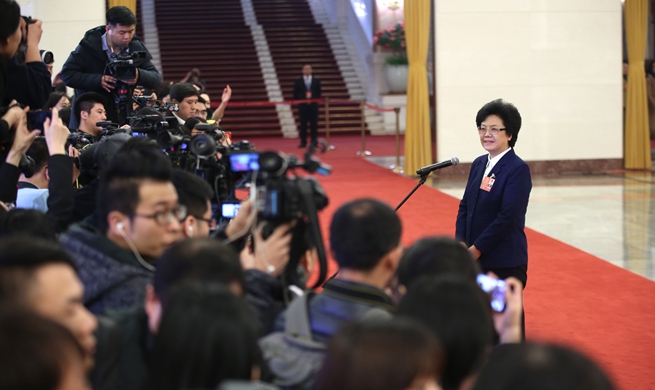WASHINGTON, March 9 (Xinhua) -- American engineers have proposed a new way to reduce a plane's lightning risk: an onboard system that would protect a plane by electrically charging it.
The study, published in the latest American Institute of Aeronautics and Astronautics Journal, found that if a plane were charged to a right level, its likelihood of being struck by lightning would be significantly reduced.
Aviation experts estimate that every commercial airplane in the world is struck by lightning at least once per year.
In thunderstorm environments, a plane's electrically conductive exterior can act as a lightning rod, sparking a strike that could potentially damage the plane's outer structures and compromise its onboard electronics.
Researchers are inspired by the fact that, when a plane flies through an ambient electric field, its external electrical state, normally in balance, shifts. As an external electric field polarizes the aircraft, one end of the plane becomes more positively charged, while the other end swings towards a more negative charge.
As the plane becomes increasingly polarized, it can set off a highly conductive flow of plasma, called a positive leader, which is the preceding stage to a lightning strike, according to researchers.
So they proposed temporarily charging a plane to a negative level to dampen the more highly charged positive end, thus preventing that end from reaching a critical level and initiating a lightning strike.
The team envisioned outfitting a plane with an automated control system consisting of sensors and actuators fitted with small power supplies.
The sensors would monitor the surrounding electric field for signs of possible leader formation, in response to which the actuators would emit a current to charge the aircraft in the appropriate direction.
The researchers developed a mathematical model to test their proposal. Their results showed that, averaging over field directions and intensities, the charged scenario required a 50 percent higher ambient electric field to initiate a leader, compared with an uncharged scenario.
It means that by charging a plane to an optimal level, its risk of being struck by lightning would be significantly reduced.
"Numerically, one can see that if you could implement this charge strategy, you would have a significant reduction in the incidents of lightning strikes," said Manuel Martinez-Sanchez from Massachusetts Institute of Technology.
Such charging would require power levels lower than that for a standard lightbulb, according to researchers.
Furthermore, Martinez-Sanchez's team is performing preliminary experiments in MIT's Wright Brothers Wind Tunnel, testing the feasibility of charging on a simple, metallic sphere.
But to make the charging system practical, researchers will have to work to speed up its response time.
Based on their modeling, Martinez-Sanchez and his colleagues have found that such a system could charge and protect a plane within fractions of a second, but this will not be enough to protect against some forms of triggered lightning.
Lightning itself poses very little danger to passengers inside a well-insulated aircraft but one that has been hit by lightning often requires follow-up inspections and safety checks that may delay its next flight.
Also, newer aircraft made partly from nonmetallic composite structures such as carbon fiber may be more vulnerable to lightning-related damage.

















